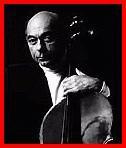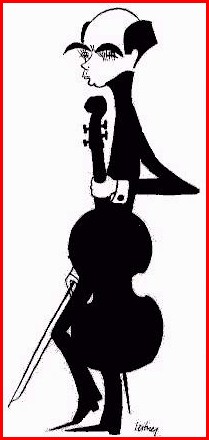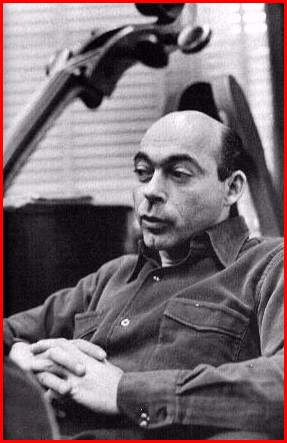Janos StarkerMartin Mayer, 1963 |  |
Janos StarkerMartin Mayer, 1963 |  |
![]() Janos Starker, who began to play the cello in Budapest in 1933, at the age of nine, first appeared on the musical horizons of a New Yorker in 1949, when he moved from Dallas to be the first cello of the Metropolitan Opera. The Met Orchestra was then being beefed up, smoothed down, and licked (not to say whipped) into shape by the remarkable combination of Fritz Reiner and George Szell (both Hungarians); it had never played so well before, and it hasn't played so well since. By common consent, the most improved section was the cellos, and the credit went, quite legitimately, to the 25-year-old new section leader. Starker was already an experienced man--he had been first cello of the Budapest Opera four years before.
Janos Starker, who began to play the cello in Budapest in 1933, at the age of nine, first appeared on the musical horizons of a New Yorker in 1949, when he moved from Dallas to be the first cello of the Metropolitan Opera. The Met Orchestra was then being beefed up, smoothed down, and licked (not to say whipped) into shape by the remarkable combination of Fritz Reiner and George Szell (both Hungarians); it had never played so well before, and it hasn't played so well since. By common consent, the most improved section was the cellos, and the credit went, quite legitimately, to the 25-year-old new section leader. Starker was already an experienced man--he had been first cello of the Budapest Opera four years before.
|  |
![]() Apart from a few months in a string quartet on the Riviera, Starker had spent 1946 and 1947 in Paris, thinking about what he wanted to do, and not playing much. He had decided a long time before--he says, when he was nine--on a career as a solo cellist. When Antal Dorati (another Hungarian) brought him from Paris to Dallas in 1948, he determined to make his career from an American base. Leaving the Met in 1952, he planned on five years with Reiner in Chicago--he was already a family man, with a four-year-old daughter, and he had to get established. World events disrupted his planning; his parents escaped from Budapest in the aftermath of the abortive revolution, and he served another year in the relative anonymity of the orchestra to bring them to America.
Apart from a few months in a string quartet on the Riviera, Starker had spent 1946 and 1947 in Paris, thinking about what he wanted to do, and not playing much. He had decided a long time before--he says, when he was nine--on a career as a solo cellist. When Antal Dorati (another Hungarian) brought him from Paris to Dallas in 1948, he determined to make his career from an American base. Leaving the Met in 1952, he planned on five years with Reiner in Chicago--he was already a family man, with a four-year-old daughter, and he had to get established. World events disrupted his planning; his parents escaped from Budapest in the aftermath of the abortive revolution, and he served another year in the relative anonymity of the orchestra to bring them to America.
![]() Starker has never regretted his time in Chicago. "Playing with Reiner," he once said, "you learn something new at every rehearsal." He still wears as a souvenir of Chicago days a tiepin given to him by the members of his section to commemorate an event of the last season. Reiner, who had been as close to Starker as he ever permits himself to be with an employee, had paid public tribute to his retiring first cellist shorly before a performance of the Verdi Requiem. At the final rehearsal, however, Starker forgot to count during a passage for unaccompanied sopranos, and came in, loudly, a bar too soon. Reiner gave him an infuriated look and threw his baton violently to the ground, where it snapped. Some time passed before the two men made it up, and in the interim the section bought Starker a gold tiepin in the shape of a broken baton.
Starker has never regretted his time in Chicago. "Playing with Reiner," he once said, "you learn something new at every rehearsal." He still wears as a souvenir of Chicago days a tiepin given to him by the members of his section to commemorate an event of the last season. Reiner, who had been as close to Starker as he ever permits himself to be with an employee, had paid public tribute to his retiring first cellist shorly before a performance of the Verdi Requiem. At the final rehearsal, however, Starker forgot to count during a passage for unaccompanied sopranos, and came in, loudly, a bar too soon. Reiner gave him an infuriated look and threw his baton violently to the ground, where it snapped. Some time passed before the two men made it up, and in the interim the section bought Starker a gold tiepin in the shape of a broken baton.
![]() As part of his campaign for solo status, Starker, while still at the Met, began making records, first for Period, a little company owned by another Hungarian. Later he moved his allegiance to Angel, where he worked for Walter Legge, who is English but easily recognizable to a Hungarian as a character out of a Molnar play. His first contact with any American lady in any business, however, had been with Wilma Cozart of Mercury, to whom Dorati had introduced him as he arrived in Dallas. "I understood no more than ten percent of what she said," Starker recalls. (This was not too bad an average: Miss Cozart is a flower of Southern femininity, whose native tongue is not always recognized as English by those brought up outside the Confederate States.) "But it was charming." There is a kind of pleasant justice in the idea that Starker, now thoroughly American and independent, with all the Hungarian leading strings cut, should wind up on the Mercury label.
As part of his campaign for solo status, Starker, while still at the Met, began making records, first for Period, a little company owned by another Hungarian. Later he moved his allegiance to Angel, where he worked for Walter Legge, who is English but easily recognizable to a Hungarian as a character out of a Molnar play. His first contact with any American lady in any business, however, had been with Wilma Cozart of Mercury, to whom Dorati had introduced him as he arrived in Dallas. "I understood no more than ten percent of what she said," Starker recalls. (This was not too bad an average: Miss Cozart is a flower of Southern femininity, whose native tongue is not always recognized as English by those brought up outside the Confederate States.) "But it was charming." There is a kind of pleasant justice in the idea that Starker, now thoroughly American and independent, with all the Hungarian leading strings cut, should wind up on the Mercury label.
 |
|
![]() In common with other modern cellists, Starker has an interesting love-hate relationship with Casals, the idol of his youth, who virtually re-invented the instrument and introduced a generation to the remarkable music written for it. But Starker feels strongly that both the technique of the instrument and the interpretation of cello pieces have advanced beyond what Casals did. "Once I played Bach like Casals," Starker says, "but I have learned better. Students must learn the modern approach to the instrument."
In common with other modern cellists, Starker has an interesting love-hate relationship with Casals, the idol of his youth, who virtually re-invented the instrument and introduced a generation to the remarkable music written for it. But Starker feels strongly that both the technique of the instrument and the interpretation of cello pieces have advanced beyond what Casals did. "Once I played Bach like Casals," Starker says, "but I have learned better. Students must learn the modern approach to the instrument."
![]() Partly because of Casals' great success in its early years, this century has been big for cellists. Composers as different from each other as Hindemith, Walton, Bloch, Virgil Thomson, Shostakovich, Britten, Samuel Barber, Kodaly, and Elliott Carter have written major works for the instrument. Competition ahs been heavy, too. Without thinking about it, anybody who keeps in touch can reel off the names of half a dozen good cellists--Piatigorsky, Rose, Schuster, Fournier, Garbousova, Silva, Janigro, Greenhouse, Rostropovich, as well as Starker. Starker this year has more major solo dates than any of the others. That he has risen to the top of such company is a great tribute to his technique, his musical perceptions, and his tough intelligence. It is also a tribute to the taste of the people who hand out the rewards in the musical world, because Starker has not pandered to the big audience in program or personality.
Partly because of Casals' great success in its early years, this century has been big for cellists. Composers as different from each other as Hindemith, Walton, Bloch, Virgil Thomson, Shostakovich, Britten, Samuel Barber, Kodaly, and Elliott Carter have written major works for the instrument. Competition ahs been heavy, too. Without thinking about it, anybody who keeps in touch can reel off the names of half a dozen good cellists--Piatigorsky, Rose, Schuster, Fournier, Garbousova, Silva, Janigro, Greenhouse, Rostropovich, as well as Starker. Starker this year has more major solo dates than any of the others. That he has risen to the top of such company is a great tribute to his technique, his musical perceptions, and his tough intelligence. It is also a tribute to the taste of the people who hand out the rewards in the musical world, because Starker has not pandered to the big audience in program or personality.
![]() He is a serious man, a major figure on the musical scene. The next generation of cellists may well be rebelling against Starker's dominance and authority just the way he rebels today against Casals.
He is a serious man, a major figure on the musical scene. The next generation of cellists may well be rebelling against Starker's dominance and authority just the way he rebels today against Casals.
POSTSCRIPT: In the years since his Mercury recordings, Janos Starker's career has taken one brilliant turn after another. Composers who have been inspired to write concertos for him include David Baker, Antal Dorati, Bernard Heiden, Jean Martinon, Miklos Rozsa, and Robert Starer. He has appeared in recital on every continent and performed with nearly all the world's major orchestras. As a much-honored Distinguished Professor on the faculty of the School of Music at Indiana University in Bloomington, his classes there attract talented string players from around the world. Elsewhere his famous master classes, string seminars, and lecture/demonstrations are an eagerly anticipated adjunct to his concert tours. In addition to his concert, recording, and teaching activities, Starker has edited a number of editions of cello music by Bach, Schubert, Bottermund, Dvorak, Beethoven, and others; published an edition of his own cadenzas; and contributed several articles on musical and humorous subjects to educational and popular periodicals. He is the author of An Organized Method of String Playing for Cello (and one for the Bass), which he developed from his own lifelong search for the most efficient and effective way to play the cello. Five honorary doctorates and numerous honors and awards (including that of Honorary Citizen, State of Texas) cap a career that now spans more than five decades--undoubtedly one of the great musical careers of our century.